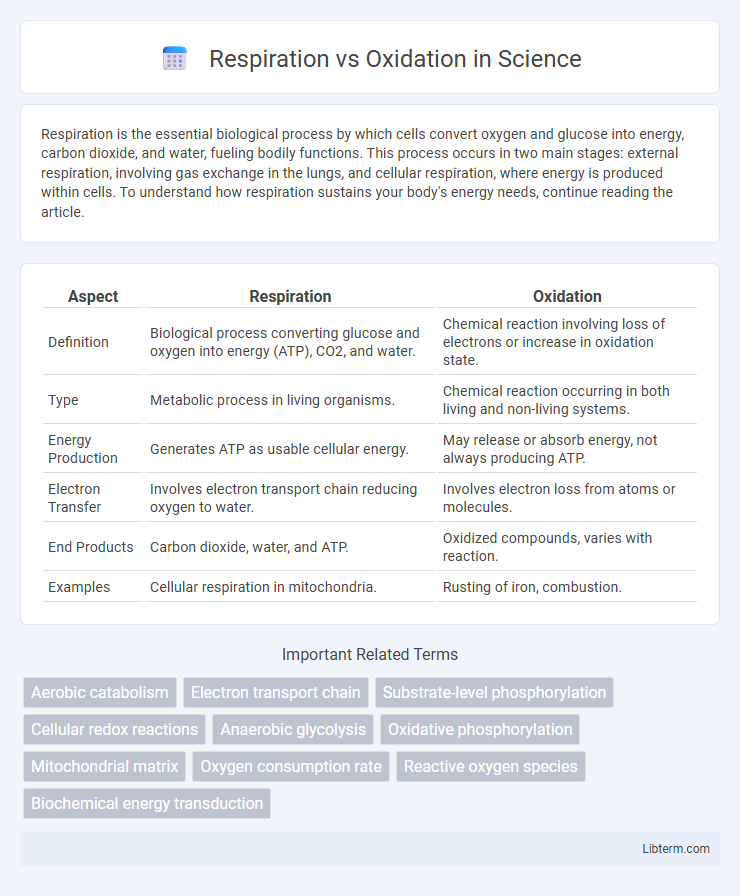Respiration is the essential biological process by which cells convert oxygen and glucose into energy, carbon dioxide, and water, fueling bodily functions. This process occurs in two main stages: external respiration, involving gas exchange in the lungs, and cellular respiration, where energy is produced within cells. To understand how respiration sustains your body's energy needs, continue reading the article.
Table of Comparison
| Aspect | Respiration | Oxidation |
|---|---|---|
| Definition | Biological process converting glucose and oxygen into energy (ATP), CO2, and water. | Chemical reaction involving loss of electrons or increase in oxidation state. |
| Type | Metabolic process in living organisms. | Chemical reaction occurring in both living and non-living systems. |
| Energy Production | Generates ATP as usable cellular energy. | May release or absorb energy, not always producing ATP. |
| Electron Transfer | Involves electron transport chain reducing oxygen to water. | Involves electron loss from atoms or molecules. |
| End Products | Carbon dioxide, water, and ATP. | Oxidized compounds, varies with reaction. |
| Examples | Cellular respiration in mitochondria. | Rusting of iron, combustion. |
Introduction to Respiration and Oxidation
Respiration is a biological process in which cells convert glucose and oxygen into energy, carbon dioxide, and water, primarily through cellular respiration involving glycolysis, the Krebs cycle, and the electron transport chain. Oxidation refers to the chemical reaction where a substance loses electrons, commonly involving oxygen but occurring in both biological and non-biological contexts. While respiration is a specific type of oxidation crucial for energy production in living organisms, oxidation broadly encompasses all electron loss reactions including combustion and corrosion.
Definition of Respiration
Respiration is a biological process in which cells convert glucose and oxygen into energy, producing carbon dioxide and water as byproducts. It involves a series of metabolic reactions that transform chemical energy stored in nutrients into adenosine triphosphate (ATP), the energy currency of the cell. Unlike oxidation, which broadly refers to the loss of electrons in chemical reactions, respiration specifically encompasses the enzymatic processes enabling energy production in living organisms.
Definition of Oxidation
Oxidation is a chemical process involving the loss of electrons or an increase in oxidation state by a molecule, atom, or ion, often accompanied by the gain of oxygen or loss of hydrogen. In biological systems, oxidation refers specifically to reactions where organic molecules lose electrons, releasing energy used for cellular activities. Unlike respiration, which is a complex metabolic process involving oxidation along with subsequent stages like electron transport, oxidation alone refers strictly to the electron transfer aspect of these reactions.
Key Differences Between Respiration and Oxidation
Respiration involves a series of enzymatic reactions where glucose is broken down with oxygen to produce energy in the form of ATP, carbon dioxide, and water, primarily occurring in living cells. Oxidation is a broader chemical process where a substance loses electrons, which can occur with or without oxygen and does not necessarily produce energy for biological functions. The key difference lies in respiration being a metabolic pathway specific to energy production in organisms, while oxidation refers to a general electron transfer process in both biological and non-biological contexts.
Biochemical Pathways Involved
Respiration primarily involves glycolysis, the citric acid cycle, and oxidative phosphorylation, where glucose is enzymatically broken down to produce ATP through electron transfer chains. Oxidation, in a biochemical context, refers to the loss of electrons during these metabolic reactions, often mediated by enzymes like dehydrogenases and oxidases in pathways such as beta-oxidation of fatty acids. The integration of these pathways ensures efficient energy extraction by coupling substrate oxidation to ATP synthesis in mitochondria.
Types of Respiration: Aerobic vs Anaerobic
Aerobic respiration involves the breakdown of glucose with oxygen, producing carbon dioxide, water, and a high yield of ATP, typically 36-38 molecules per glucose. Anaerobic respiration occurs in the absence of oxygen, resulting in less efficient energy production and generating byproducts such as lactic acid or ethanol depending on the organism. The key distinction lies in the electron acceptor: oxygen in aerobic respiration and inorganic molecules like nitrate or sulfate in anaerobic respiration.
Role of Oxidation in Cellular Metabolism
Oxidation in cellular metabolism involves the loss of electrons from molecules, primarily organic substrates, facilitating energy extraction. This process drives the electron transport chain within mitochondria, enabling ATP synthesis through oxidative phosphorylation. Respiration utilizes oxidation coupled with reduction reactions to efficiently convert biochemical energy into usable cellular fuel.
Importance in Energy Production
Respiration is a biological process that efficiently converts glucose and oxygen into energy-rich ATP molecules, essential for cellular functions and survival. Oxidation refers to the chemical reactions involving electron transfer, which occur during respiration and other metabolic pathways to release energy stored in nutrients. The synergy between respiration and oxidation is crucial for sustaining life, as it drives energy production necessary for growth, repair, and homeostasis in living organisms.
Applications in Biological Systems
Respiration in biological systems involves the enzymatic breakdown of glucose to produce ATP, essential for cellular energy and metabolic functions. Oxidation refers to chemical reactions where molecules lose electrons, often seen in cellular metabolism, including the electron transport chain during respiration. Understanding these processes aids in medical research on metabolic disorders and the development of therapies targeting mitochondrial dysfunction.
Summary: Respiration vs Oxidation
Respiration is a biological process where cells convert glucose and oxygen into energy, carbon dioxide, and water through a series of enzymatic reactions, primarily in mitochondria. Oxidation is a chemical process involving the loss of electrons from a molecule, which can occur in both biological and non-biological contexts. While respiration includes oxidation as a key step, it specifically refers to energy production in living organisms, making it a specialized form of oxidation.
Respiration Infographic

 libterm.com
libterm.com